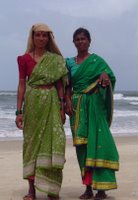
Revolutionary initiative (The Hindu, Aug 28th 2005)
SMITA JAIN
"THE solution for a major health hazard that afflicts our entire nation," says Anshu Gupta of Goonj, "is as simple as providing clean cloth." In his matter-of-fact manner, Anshu went on to explain the modus operandi behind Delhi-based Goonj's latest revolutionary cloth-recycling initiative: collecting donated cotton cloth to create sanitary napkins for millions of women across the country.
Unconventional
Goonj's history and programmes show that the organisationand its founder Anshu Gupta, are anything but ordinary. While many in the development sector tend to seek macro-solutions for social issues, Goonj was founded in 1999 with the simple goal of meeting the clothing needs of less-privileged people by utilising clothing donated by those more privileged. In this way, the organisation revolves around a widely known but seldom-implemented philosophy: one person's rags can indeed be someone else's riches, especially in context of India's gigantic urban-rural divide.
Cloth, Anshu stresses, is one of three basic necessities for humankind, yet few agencies give it much importance. "We document the number of people who die of floods and of earthquakes. Yet how often has the Government ever counted the numbers who die — mind you, preventable deaths — of the cold everyday during Delhi's winters?"
Goonj's School-to-School programme, which recently won the Changemaker's Innovation Award for its excellence, involves a partnership between a privileged urban school and a rural school, in which urban students from give their rural counterparts school paraphernalia that they would normally have discarded. Schools that wish to participate in the programme are given reading material — printed on one-side used paper — to distribute. Thus, children are sensitised on issues facing their less-privileged counterparts, and are encouraged to think about the value of their own education and the ways they can help children in less-fortunate circumstances.
Goonj's latest project to utilise donated cotton clothing for creating sanitary napkins is based on the knowledge that many women — and hence their families — suffer major health consequences on account of using unhygienic cloth during menstruating days. This can lead to infections, which can cause multi-organ failure, infertility, and in certain circumstances, even cervical cancer. The consequences can also be multi-fold, as an infection can have an effect not only on the woman, but on the lives of her children born and unborn. The situation in India is not one to be taken lightly; indeed, India has one of the highest infant and maternal mortality rates in the world.
Needless to say, few women and even fewer men would dare to address this issue, preferring instead to keep the "dirty laundry in the house". Therefore, it came as a surprise to hear this Ashoka Fellow nonchalantly discussing the motivations behind his latest endeavour. "I have travelled far and wide across India, and everywhere, the situation is the same. Since menstruation is considered to be `pollution', women use the dirtiest cloth in the house — cloth that has been used to clean the floors, the bathrooms. And because it is imperative that the cloth be hidden from the neighbours, it does not ever see the light of day.
First step
Furthermore, there are usually two or three women in a household all using the same cloth. "And in this context of shame, of extreme health-risks, we often overlook this reality and give them lectures on reproductive health and maternity care. We still have a long way to go, but providing some clean cloth is a good first step." In fact, the gravity of the situation struck Anshu most deeply when a village woman in Uttar Pradesh told him how her sister had died of tetanus acquired through a cloth she had used during her menstruating days. The cloth was from a sari blouse, on which the hooks had not been removed.
Goonj is seeking donations of clean cotton clothing and bed sheets, which can be donated at any of Goonj's collection centres. They are also looking for funds to purchase of a sterilising machine to clean the donated cloth. If you would like more information on Goonj's activities or would like to donate, contact Anshu at 98681-46978 or anshu_goonj1@yahoo.co.in, or access www.goonj.info
Read the article: http://www.hindu.com/mag/2005/08/28/stories/2005082800100400.htm
No comments:
Post a Comment